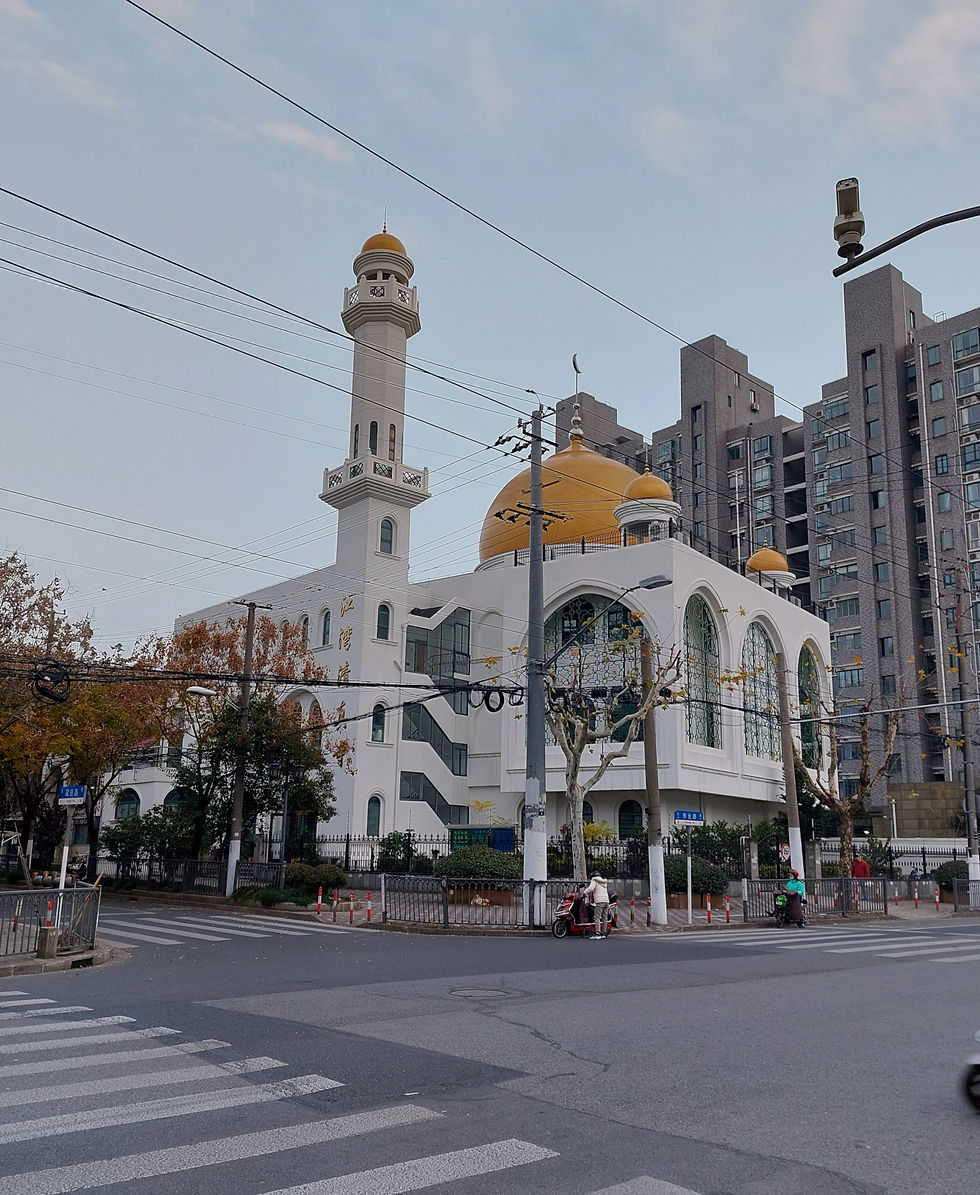Islamic culture in Shanghai
- May 29, 2022
- 4 min read

The Huxi Mosque is not far from my place of work. So one weekend I threw myself on one of those rental city bikes to visit them. On Fridays there is always a halal market in front of it, actually I had planned to go there on such a day, especially since there is always good food there, but on Fridays I don't get out of school before 6 p.m., in China teaching is an office job eight to five - on Fridays in my case until 18:00. Visiting the market would have been a holiday project, but unfortunately the lockdown threw a spanner in the works. By the way, one of my first trips to China would have been to Xinjiang, where the Uyghurs live. The landscapes and the cities there, especially Kashgar, are sensational. But unfortunately that didn't work either - due to the lockdown. Incidentally, Xinjiang is about 4000 kilometers away from Shanghai. Just as a size comparison: From Bochum to Moscow it is about 2300 kilometers, if you then drive further east, after about 4000 kilometers in the South Urals you reach the capital of Bashkortostan, Ufa. Bashkiria and Tatars live there and the majority of the population is Muslim . The size of China is hardly known in Germany. It is generally striking how little people in Germany know about China. The problem, however, is that everyone thinks they have a very accurate picture. There is a butcher shop for halal meat in front of the Huxi Mosque. A Muslim who sits in front of the mosque courtyard all day showed me the building. However, he would not allow me to take photos inside.

The Xiaotaoyuan Mosque seen below is in the middle of old Chinese Shanghai. By that I mean the old town, which can still be clearly seen on the city map today, since a ring road surrounds this old town. The Chinese city wall used to run there. By the way, if you want to visit the old city wall, you have to look for it. Only a few remains can be found. It is roughly comparable to Cologne. There is also a ring road and if you search, you will also find a few meters of city wall in Cologne, But now it's about the mosque. The Xiaotaoyuan Mosque is located at the corner of He'nan Road and Fuxing Road. The mosque is illuminated in the evening.

Unfortunately the buildings were closed. It's quite a large complex, but I only got to see the outside of it. A sign next to the entrance refers to the monument protection. Like many buildings in Shanghai, the mosques also belong to the so-called "heritage architecture".

The car next to the building is not a police car, but a taxi and cameras are part of everyday life in Shanghai, not just at this building. In London they are also part of everyday life. Friday prayers take place in the mosques as well as Christian services in churches. There are also temples where Buddhist monks live and practice their faith. From the outside, China is an atheist country, but there are many religious groups that are free to practice their faith there.

There are many restaurants in Shanghai that offer western Chinese cuisine from the Uyghur province of Xinjiang. Apart from the many food stalls that serve the typical lamb skewers with cumin, which are reminiscent of Turkish cuisine that we also find in Germany, there is a Uyghur restaurant in the immediate vicinity of my school, where I often and enjoyed eating. I was always the only European there, but I'm one of the very few Europeans in my neighborhood anyway... actually I've never seen anyone else. I was always noticed in the restaurant and I was often spoken to or photographed. By the way, there is also West Chinese beer: Wusu (but belongs to the Carlsberg Group). The inscription on the bottle looked like a mixture of Latin and Arabic letters. I didn't really understand why alcohol is drunk in western Chinese culture.


The Uyghur restaurant chain "Xibo" has several restaurants in Shanghai. The restaurant with this interesting headwear decoration is located in Jing'an District on Changshu Road between Changle Road and Julu Road. These colorfully embroidered doppas, which decorate a wall in the entrance area, are worn by men. The embroidery patterns show the exact origin of a Uyghur.

Handicrafts have a long tradition among the Uyghurs. More than a thousand years ago, the Chinese envoy Wang Yen (981-984) wrote in his travelogue: "I was impressed by the extensive civilization in the Uyghur Empire. The beauty of the temples, monasteries, murals, statues, towers, gardens, dwellings and palaces throughout the kingdom cannot be described. The Uyghurs are very skilled in the crafts of gold and silver, vases and ceramics. Some say that only God gave them this talent.”
https://www.uyghurcongress.org/de/architektur-kunst-musik-und-druckkunst/


The Jiangwan Mosque is located in the Yangpu District. Here you are a bit further away from the tourist areas. The mosque was also closed, so I could only look at it from the outside.



What amazed me is the possibility of being able to practice one's religion in China. If you only have a vague image of China, you get the impression that practicing religion is forbidden in China.


